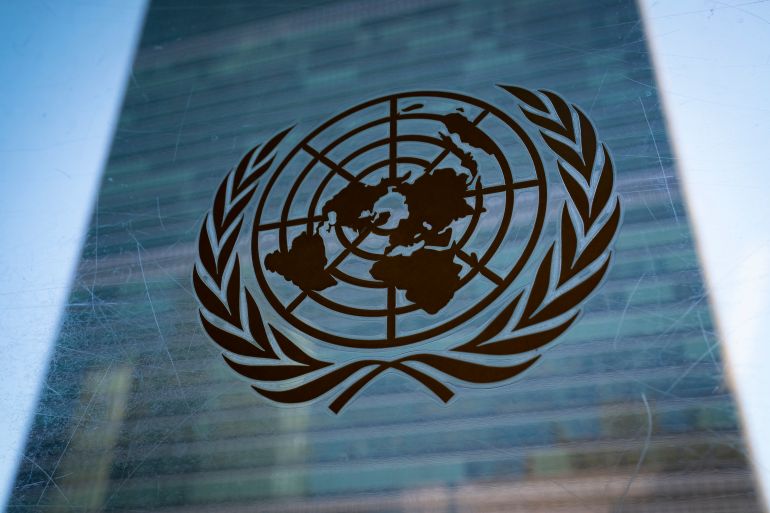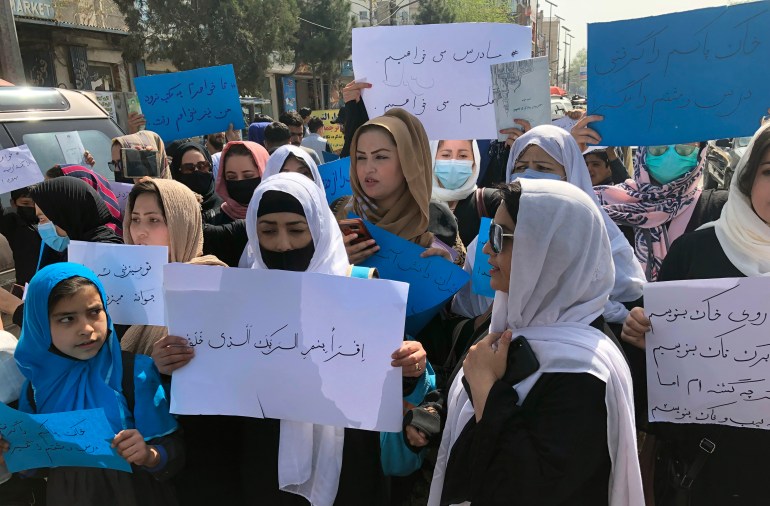UN chief demands Taliban revoke ban on women staff
The UN said that it cannot accept a Taliban decision to bar Afghan female staffers from working at the agency.

The UN has said that it cannot accept a Taliban decision to bar Afghan female staffers from working at the agency, calling it an “unparalleled” violation of women’s rights.
The statement on Wednesday came a day after the UN said it had been informed by Afghanistan’s governing Taliban that Afghan women would no longer be allowed to work for the world body. That announcement came after the UN mission in the country expressed concern that its female staffers were prevented from reporting to work in eastern Nangarhar province.
Keep reading
list of 4 itemsAfghanistan school year starts without millions of teenage girls
UN extends Afghanistan mission by another year
International Women’s Day: The exclusion of Afghanistan’s women
UN Secretary-General Antonio Guterres demanded that the ban be “immediately revoked”.
“This is a violation of the inalienable fundamental human rights of women,” UN spokesman Stephane Dujarric said in a statement on behalf of Guterres on Wednesday.
The Taliban have not commented publicly on the ban or released a statement.
The UN statement said several UN national female personnel have already experienced restrictions on their movements, including harassment, intimidation and detention.
“The UN has therefore instructed all national staff – men and women – not to report to the office until further notice,” the statement said.
Despite initial promises of a more moderate rule than during its previous stint in power, the Taliban have imposed harsh measures since taking over the country in 2021 as US and NATO forces pulled out of Afghanistan after two decades of war.
Girls are banned from education beyond sixth grade. Women are barred from working, studying, travelling without a male companion, and visiting parks. Women must also cover themselves from head to toe.

Afghan women were already barred from working at national and international non-governmental organisations, disrupting the delivery of humanitarian aid. Still, the ban did not previously cover working for the UN.
That changed this week. On Wednesday, the UN mission said that according to the Taliban order, no Afghan woman is permitted to work for the UN in Afghanistan and that “this measure will be actively enforced.”
The ban is unlawful under international law and cannot be accepted by the United Nations, the statement said.
The secretary-general’s special representative for Afghanistan, Roza Otunbayeva, is engaging Taliban authorities to convey the UN’s protest and to seek an immediate reversal of the order. The UN said it is also engaging member states, the donor community and humanitarian partners.
“In the history of the United Nations, no other regime has ever tried to ban women from working for the Organization just because they are women,” said Otunbayeva. “This decision represents an assault against women, the fundamental principles of the UN, and on international law.”
The UN has about 3,900 staff in Afghanistan, including approximately 3,300 Afghans and 600 international personnel, UN spokesman Stephane Dujarric said. The total also includes 600 Afghan women and 200 women from other countries.
Otunbayeva is a former president and foreign minister of the Kyrgyz Republic. She was appointed by the secretary-general in coordination with the UN Security Council. A UN spokesman said Tuesday that there had been no Taliban action regarding the UN’s senior leadership.
Taliban restrictions in Afghanistan, especially the bans on education and NGO work, have drawn fierce international condemnation. But the Taliban have shown no signs of backing down, claiming the bans are temporary suspensions in place allegedly because women were not wearing their headscarf, or hijab, correctly and because gender segregation rules were not being followed.